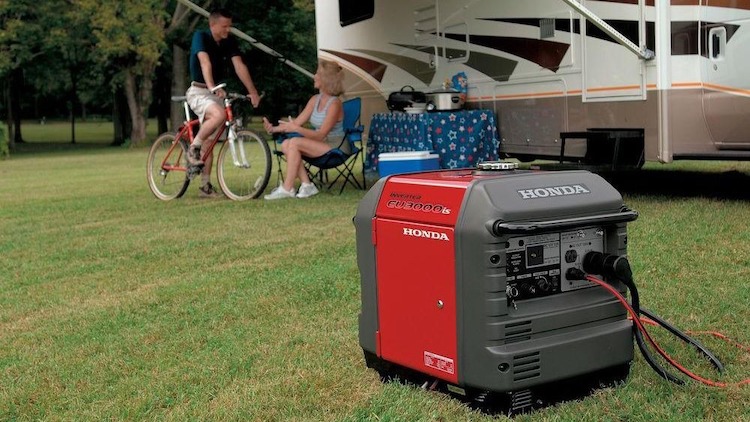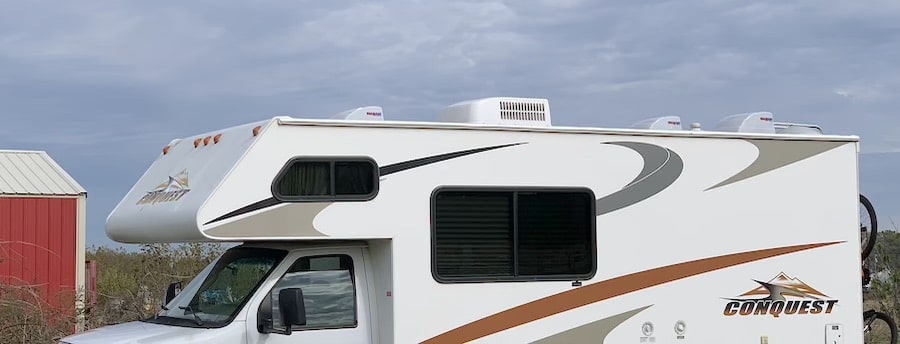Thanks for your support! If you make a purchase using our links in this article, we may make a commission. And, as an Amazon Associate, I earn from qualifying purchases. See the full disclosure here.
After you purchase your RV, you will be excited to take it out and get your first trip started. Many people will choose the summer as the ideal time of year to take their RV out on the road. During this time you will probably want to use an air conditioner so that you have a place to cool down after a long day out in the heat. However, you also may be curious about the power required to run your air conditioner. Can an air conditioner run on 110 electric power? Yes, you will be able to run your air conditioner with that level of power. However, you will not be able to run anything else because it will take up the majority of your electric power.
When you power the appliances in an RV you have a limited amount of electric power. The amount of power you have will vary based on the RV you purchased. If you are using an RV with 110 electric power, you are using an RV with a lower amount of electric power. An air conditioner will use up nearly all of that power. As a result, you will not be able to use your coffee maker, hair dryer, microwave, or anything else that requires electric power while it is running. So, you will need to balance how much and how often you use your air conditioner.
Can I Run My RV AC When Plugged Into My House?
The first thing you need to understand before we get into answering this question is the conversion between electric power and amps. Typically, 110 electric power is going to give you around 15 amps. The average air conditioner that you use in your RV will require 13.5 amps to run.
The average electric socket that you find all over your house is going to give you 15 amps. As a result, it is possible to run your RV air conditioner when you are plugged into your house. However, that is all you will be able to run because it will take up the majority of your electric power. So, you can keep your RV cool while you run inside to get something before you leave, but you cannot run a microwave, or coffee maker, or any other appliance.
Can I Run My RV AC When Plugged Into a Generator?

Every RV owner needs a generator. Many campsites will have a source for you to plug in your RV and power your appliances. However, there is always the risk that there will be a power outage and you will be out of luck. In these situations you need a generator so that you can power your appliances in an emergency.
Generators work like RV shore power as they plug into your air conditioning system and provide AC power. Your average generator will not provide as much RV power as shore power does, but that mostly depends on the size of your generator. Generators are rated in watts instead of amps. So, you will need a generator with more watts if you have a larger RV. Typically, you will want a 1000 watt generator for a small RV if you do not want to run an air conditioner. However, if you do need to run an air conditioner you will need a larger generator.
So, you can run your air conditioner while you are plugged into a generator. However, you need to make sure that it is generating at least 110 electric power. Otherwise, you will not have enough power to run your air conditioner.
Can I Run My RV Air Conditioner on Battery Power?
Unfortunately, you will almost certainly not be able to run your RV air conditioner on battery power. It takes a great deal of power to start up your air conditioner, and even more electricity to keep it running for an hour. In theory, it is possible to be able to do this. However, it would require a tremendous amount of battery power and that is just not realistic for most people.
Most RVs these days are equipped with a 15,000 BTU air conditioner. One air conditioner of this size requires a minimum of 3500 watts just to start it up. It then will take about 1500 watts of constant power to keep it running. What this all means is that you need a minimum of a 4000 watt DC-to-AC power inverter. You need one of these to convert your battery power to usable AC electricity. Unfortunately, most RVs do not come equipped with an inverter that size. Instead, they come equipped with an inverter ranging from 1000 to 2000 watts. As a result, you will need to purchase a new inverter if you want to use battery power.
Can I Plug My RV Into a 110 Outlet?
When you are at home, you may be tempted to plug your RV into your house’s electrical system. However, it is generally not recommended to do this for an extended period of time. It is possible to power your RV for a short period of time with an outlet from your house. However, doing so for a long time can have consequences.
A Non Technical Explanation of 110 Electric Power
There are many ways to measure electricity, amps, watts, electric power, and many more. Typically, electric power is used as a measurement for the power that comes from an outlet or something of that nature. Conversely, amps are used to indicate how much power is required to use them. 110 electric power is incredibly common because it is the power that a typical outlet generates. 110 electric power is equal to 15 amps.
Most appliances will tell you what the required wattage or amperage is to run the appliance. Here is the amperage draw for some common RV appliances and electronics.
- Roof air conditioner – 13.5 amps
- Coffee maker – 8.3 amps
- Converter – 8 amps
- Hair dryer – 9 to 12 amps
- Microwave – 13 amps
- Refrigerator – 2.8 amps
- TV – 1.5 amps
- Toaster – 8 to 10 amps
- DVD – 2 amps
- Electric skillet – 6 to 12 amps
What Does 30 Amp and 50 Amp Mean?
When you are dealing with amperage, wattage, and electric power it can be easy to get confused. Not everyone is a mechanic or technician and understands all the technical aspects of RV ownership. However, there are some things you should know after you purchase your first RV.
A 30 amp service supplies a total of 30 amps of 120 volts AC on a single line. Conversely, 50 amp power actually provides two separate 50 amp lines, for a total capacity of 100 amps. So, although it may seem like a 30 amp service is only slightly less effective than a 50 amp service, it is actually more than three times less powerful.
Do I Need a Surge Protector for My RV?
Everyone has heard the phrase, better safe than sorry. That phrase applies perfectly in this situation because ideally you will never need it, but if you ever do need but you will be glad you have it when you do. It is the same reason you buy a toilet plunger. You hope you do not need it, but it would really suck to not have one when you needed it.
Every RV owner should have some sort of voltage protection for their RV. If you do not have one, all it is going to take in one voltage spike to cause thousands of dollars of damage. Losing all that money and time could be avoided if you simply took the time to purchase and install a surge protector before you took out your RV for the first time.
Can I Run My RV AC While Driving?
Yes, in most cases you can run both your dash air conditioner and roof air conditioner while driving. However, this largely depends on the source of energy you are using to run the rooftop air conditioner. As for running the dash air conditioner, you can run it all the time without any issues.
Running an air conditioner requires more power than any other appliance in your RV. As a result, that means you will be using more gas than you would be if it were not running. So, when you run your air conditioner, you will notice that your miles per gallon will drop. This is not an issue when you use the dash air conditioner, it is only a problem when using the roof air conditioner.
Many people may ask why you would run your rooftop air conditioner instead of just using your dash AC? It mostly comes down to the size of RVs. The dash air conditioner that you have in your RV is not any more powerful than the one installed in a regular car. As a result, it does not have the power to cool such as large space. So, people need to use their roof air conditioners to ensure that they are kept cool on a long road trip.
However, it is important to keep an eye on your fuel level while you have your roof air conditioner running. As we mentioned above, having your AC running will have a significant effect on your miles per gallon. As a result, you will run out of gas sooner than you would normally expect. So, you need to keep a close eye on your fuel levels so that you do not run out gas unexpectedly.
Stay Cool on Your Next Trip with Your RV Air Conditioner
After reading, we hope you have all the information you need relating to RV air conditioners and how they are powered. We know there is a lot of information and it can be difficult to understand, but it is important to have some knowledge on these topics. Not everyone needs to have an insane level of technical knowledge about every aspect of their RV. However, everyone should have a little bit of knowledge so that they can make informed decisions relating to their RV appliances.
Your RV air conditioner is one of the most important appliances in your RV. When you go out on a trip during the summer, you will be in situations where it is incredibly hot outside. After a long day out in the sun, it is extremely refreshing to go inside your RV with the air conditioner blasting cold air. However, that is not possible if you cannot power it. As a result, you need to make sure that you have the correct electric power to power your air conditioner.
Finally, before you head out on the road, it is very important that you purchase a surge protector. An electrical surge with out any surge protection can cause thousands of dollars in damages. The price of a surge protector far outweighs the possible price of surge damages. So, take the time to purchase a surge protector before you take your first trip.
Are you a new or experienced RV owner? Have you purchased your first RV yet? What type of RV do you own or plan on buying? Let us know in the comments!



Thanks. We are brand new to RVing and like our AC.
Can I use my coffee maker and my heater separately plugged into a 110 outlet on my 24ft RV
just those nothing else small coffee maker if bigger just the coffee maker make the coffee then turn on heater plus do not run on same circuit heater is 1000 to 1500 watts a big coffee maker may take up to a 1000 watts